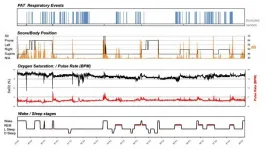(Press-News.org) A new mathematical model for the interaction of bacteria in the gut could help design new probiotics and specially tailored diets to prevent diseases. The research, from Chalmers University of Technology in Sweden, was recently published in the journal PNAS.
"Intestinal bacteria have an important role to play in health and the development of diseases, and our new mathematical model could be extremely helpful in these areas," says Jens Nielsen, Professor of Systems Biology at Chalmers, who led the research.
The new paper describes how the mathematical model performed when making predictions relating to two earlier clinical studies, one involving Swedish infants, and the other adults in Finland with obesity.
The studies involved regular measurements of health indicators, which the researchers compared with the predictions made from their mathematical model - the model proved to be highly accurate in predicting multiple variables, including how a switch from liquid to solid food in the Swedish infants affected their intestinal bacterial composition.
They also measured how the obese adults' intestinal bacteria changed after a move to a more restricted diet. Again, the model's predictions proved to be reliably accurate.
"These are very encouraging results, which could enable computer-based design for a very complex system. Our model could therefore be used to for creating personalised healthy diets, with the possibility to predict how adding specific bacteria as novel probiotics could impact a patient's health," says Jens Nielsen.
Many factors at play
There are many different things that affect how different bacteria grow and function in the intestinal system. For example, which other bacteria are already present and how they interact with each other, as well as how they interact with the host -- that is to say, us. The bacteria are also further affected by their environmental factors, such as the diet we eat.
All of these variables make predicting the effect that adding bacteria or making dietary changes will have. One must first understand how these bacteria are likely to act when they enter the intestine or how a change in diet will affect the intestinal composition. Will they be able to grow there or not? How will they interact with and possibly affect the bacteria that are already present in the gut? How do different diets affect the intestinal microbiome?
"The model we have developed is unique because it accounts for all these variables. It combines data on the individual bacteria as well as how they interact. It also includes data on how food travels through the gastrointestinal tract and affects the bacteria along the way in its calculations. The latter can be measured by examining blood samples and looking at metabolites, the end products that are formed when bacteria break down different types of food," says Jens Nielsen.
The data to build the model has been gathered from many years' worth of pre-existing clinical studies. As more data is obtained in the future, the model can be updated with new features, such as descriptions of hormonal responses to dietary intake.
A potential huge asset for future healthcare
Research on diet and the human microbiome, or intestinal bacterial composition, is a field of research that generates great interest, among both researchers and the general public. Jens Nielsen explains why:
"Changes in the bacterial composition can be associated with or signify a great number of ailments, such as obesity, diabetes, or cardiovascular diseases. It can also affect how the body responds to certain types of cancer treatments or specially developed diets."
Working with the bacterial composition therefore offers the potential to influence the course of diseases and overall health. This can be done through treatment with probiotics - carefully selected bacteria that are believed to contribute to improved health.
In future work, Jens Nielsen and his research group will use the model directly in clinical studies. They are already participating in a study together with Sahlgrenska University Hospital in Sweden, where older women are being treated for osteoporosis with the bacteria Lactobacillus reuteri. It has been seen that some patients respond better to treatment than others, and the new model could be used as part of the analysis to understand why this is so.
Cancer treatment with antibodies is another area where the model could be used to analyse the microbiome, helping to understand its role in why some patients respond well to immunotherapy, and some less so.
"This would be an incredible asset if our model can begin to identify bacteria that could improve the treatment of cancer patients. We believe it could really make a big difference here," says Jens Nielsen.
INFORMATION:
For more information, contact:
Jens Nielsen, Professor, Department of Biology and Biological Engineering, Chalmers University of Technology +45 41 72 79 30, nielsenj@chalmers.se
Read the whole study in PNAS: CODY enables quantitatively spatiotemporal predictions on in vivo gut microbial variability induced by diet intervention
The article's authors are Jun Geng, Boyang Ji, Gang Li, Felipe López-Isunza and Jens Nielsen.
The researchers are active at Chalmers University of Technology and the Wallenberg Center for Protein Research in Sweden, the Novo Nordisk Foundation Center for Biosustainability and BioInnovation Institute, DTU in Denmark, and Universidad Autónoma Metropolitana-Iztapalapa in Mexico.
The research has been financed by the Bill & Melinda Gates Foundation, Novo Nordisk Foundation and the Knut and Alice Wallenberg Foundation.
Newly published research contained in the Special Issue of the Journal of Marketing features fourteen global author teams focused on the topic of Better Marketing for a Better World. Edited by Rajesh Chandy (London Business School), Gita Johar (Columbia University), Christine Moorman (Duke University), and John Roberts (University of New South Wales), this Special Issue brings together wide-ranging research to assess, illuminate, and debate whether, when, and how marketing contributes to a better world.
The Special Issue is built on the thesis that marketing has the power to improve lives, sustain livelihoods, strengthen societies, and benefit the world at large. It calls for a renewed ...
PORTLAND, Ore. - Policies designed to prevent the misuse of opioids may have the unintended side effect of limiting access to the pain-relieving drugs by terminally ill patients nearing the end of their life, new research led by the Oregon State University College of Pharmacy suggests.
A study of more than 2,500 hospital patients discharged to hospice care over a nine-year period showed a decreasing trend of opioid prescriptions as well as an increase in the prescribing of less powerful, non-opioid analgesics, meaning some of those patients might have been undertreated for their pain compared to similar patients in prior years.
The findings, published in the Journal of Pain and Symptom Management, are an important step toward optimizing ...
Philadelphia, April 20, 2021 - A collaborative study from the Center for Injury Research and Prevention (CIRP) and the Center for Autism Research (CAR) at Children's Hospital of Philadelphia (CHOP) identified clear strengths and a series of specific challenges autistic adolescents experience while learning to drive. The findings were recently published by the American Journal of Occupational Therapy.
Researchers conducted in-depth interviews with 17 specialized driving instructors who were trained as occupational therapists, driving rehabilitation specialists, or licensed driving instructors and who had completed additional training related ...
Flushing a toilet can generate large quantities of microbe-containing aerosols depending on the design, water pressure or flushing power of the toilet. A variety of pathogens are usually found in stagnant water as well as in urine, feces and vomit. When dispersed widely through aerosolization, these pathogens can cause Ebola, norovirus that results in violent food poisoning, as well as COVID-19 caused by SARS-CoV-2.
Respiratory droplets are the most prominent source of transmission for COVID-19, however, alternative routes may exist given the discovery of small numbers of viable viruses in urine and stool samples. Public restrooms are especially cause for concern for transmitting COVID-19 because they are ...
A new UCLA study finds that the proportion of physicians who are Black in the U.S. has increased by only 4 percentage points over the past 120 years, and that the share of doctors who are Black men remains unchanged since 1940.
The research also spotlights a significant income gap between white and Black male physicians -- a disparity, the researcher writes, that could reflect a combination of pay discrimination and unequal access for physicians to pursue careers in more lucrative specialties. The paper will be published April 19 in the peer-reviewed Journal of General Internal Medicine.
"These findings demonstrate how slow progress has been, and how far and fast we have to go, if we care about the diversity of the physician workforce and the health benefits such diversity brings ...
COLUMBUS, Ohio - A high daily dose of an omega-3 supplement may help slow the effects of aging by suppressing damage and boosting protection at the cellular level during and after a stressful event, new research suggests.
Researchers at The Ohio State University found that daily supplements that contained 2.5 grams of omega-3 polyunsaturated fatty acids, the highest dose tested, were the best at helping the body resist the damaging effects of stress.
Compared to the placebo group, participants taking omega-3 supplements produced less of the stress hormone cortisol and lower levels of a pro-inflammatory protein during a stressful event in the lab. And while levels of protective compounds sharply declined in the placebo group after the stressor, there were ...
A Monash University study has uncovered for the first time a way to prevent and reverse damage caused by broken-heart syndrome, also known as Takotsubo cardiomyopathy.
Using mouse models, the pre-clinical study published in the acclaimed journal Signal Transduction and Targeted Therapy, has shown the cardioprotective benefit of a drug called Suberanilohydroxamic acid, or SAHA, dramatically improved cardiac health and reversed the broken-heart. The landmark study used SAHA to target genes and is a world first for Takotsubo cardiomyopathy.
SAHA, currently used for cancer treatment, is approved by the US Food and Drug Administration (FDA) and Australian Therapeutic Goods Administration (TGA), works by providing a protective benefit to genes and ...
For the first time, a study has shown a clear link between the frequency and duration of unconscious wakefulness during night-time sleep and an increased risk of dying from diseases of the heart and blood vessels, and death from any cause, particularly in women.
The study of 8001 men and women, which is published today (Tuesday) in the European Heart Journal [1], found that women who experienced unconscious wakefulness most often and for longer periods of time had nearly double the risk of dying from cardiovascular disease during an average of between 6 and 11 years' ...
Taking multivitamins, omega-3, probiotics or vitamin D supplements may lessen the risk of testing positive for SARS-CoV-2, the virus responsible for COVID-19 infection--at least among women--indicates a large population study, published online in the journal BMJ Nutrition Prevention & Health.
But taking any of vitamin C, zinc, or garlic supplements wasn't associated with a lower risk of testing positive for the virus, the findings show.
There has been plenty of celebrity endorsement of the use of dietary supplements to both ward off and treat COVID-19 infection since the start of the pandemic, note the researchers.
In the UK alone, market share ...
Nanochannels have important applications in biomedicine, sensing, and many other fields. Though engineers working in the field of nanotechnology have been fabricating these tiny, tube-like structures for years, much remains unknown about their properties and behavior.
Now, University of Maryland mechanical engineering associate professor Siddhartha Das and a group of his Ph.D. students have published surprising new findings in the journal ACS Nano. Using atomic-level simulations, Das and his team were able to demonstrate that charge properties as well as charge-induced fluid flow within a functionalized nanochannel does not always behave as expected.
"We've discovered a new context for nanochannels functionalized by grafting ...


